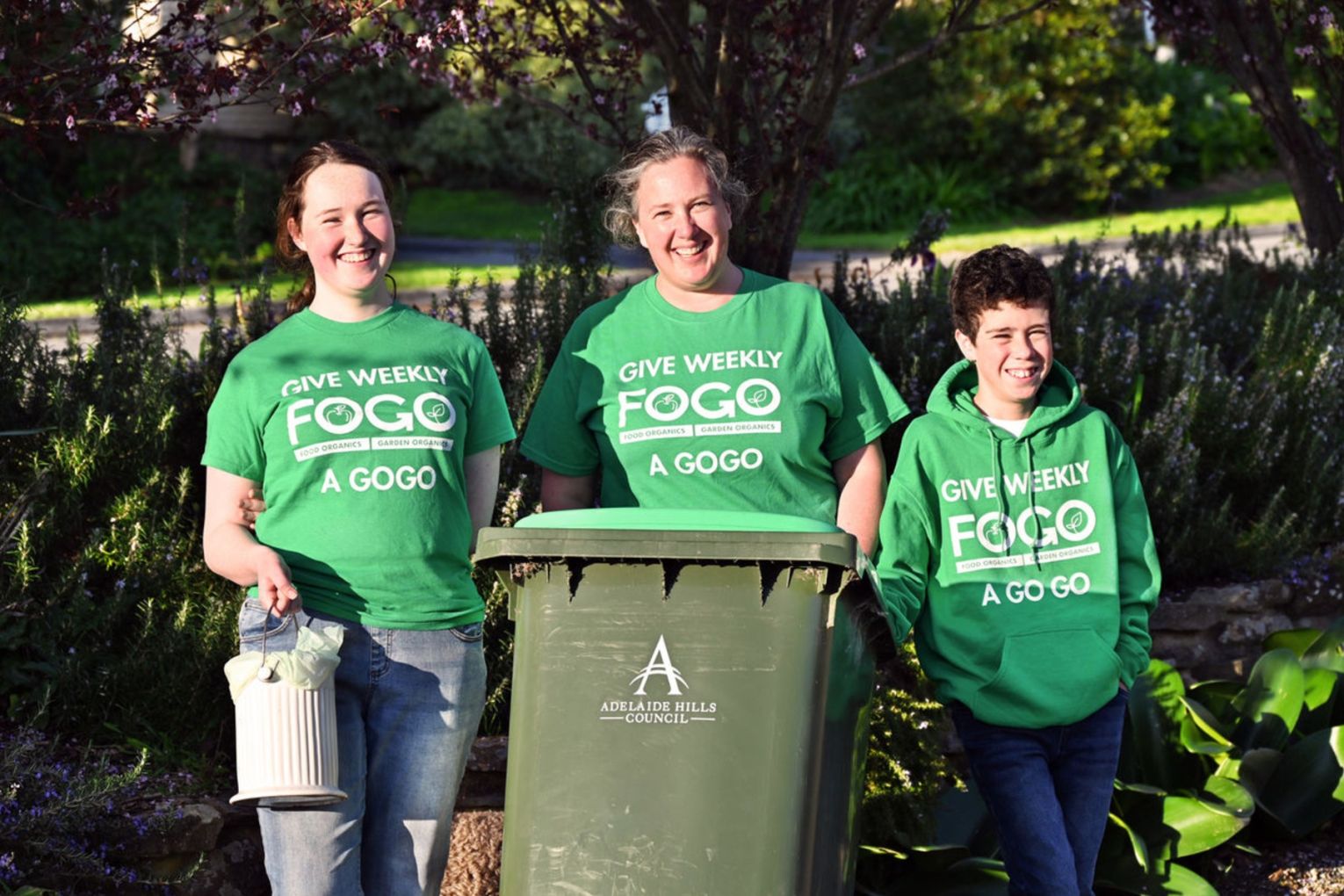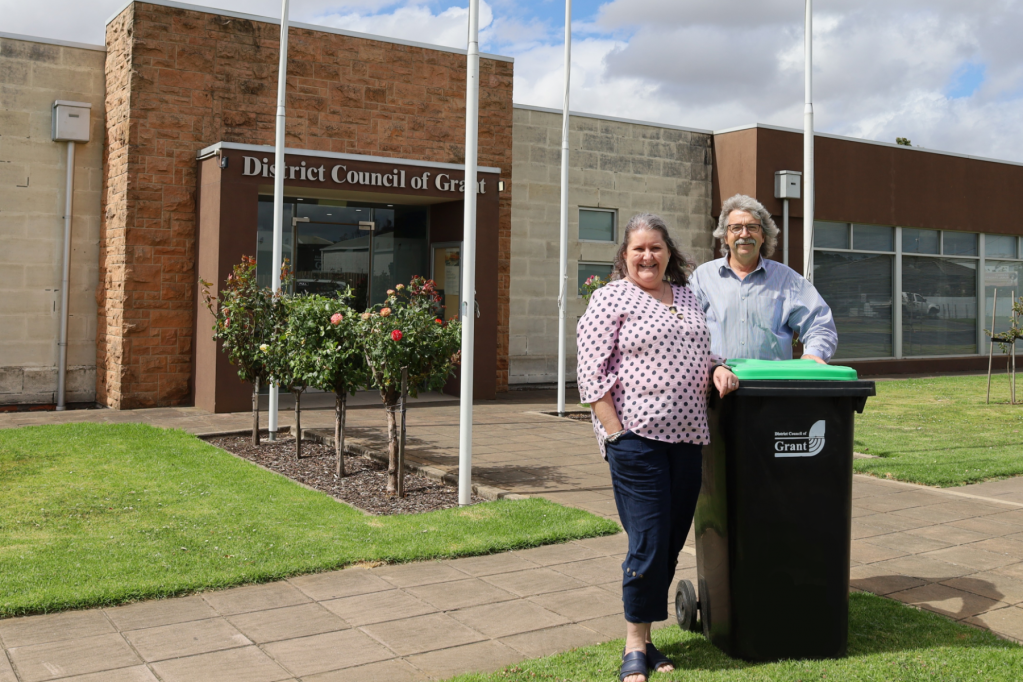Turning scraps into solutions: How SA councils are leading the FOGO movement
Across South Australia, councils are taking a fresh approach to organic materials waste by rethinking how communities handle food and garden organics. And the results are already paying off for our economy and environment.

FOGO, which stands for Food Organics and Garden Organics, recycling has a big impact. In 2023-24 material from your green bin was commercially composted into $26.7 million worth of products.
If it grows, it goes in FOGO. That means everything from apple cores and eggshells to meat, seafood and bones, paper towels and garden clippings can be placed in the FOGO bin, where it’s collected and turned into compost instead of going to landfill.
This organic material is transformed into nutrient-rich compost used to grow new produce, completing a true “closed loop” system.
Tackling food waste, one bin at a time
Food waste is one of South Australia’s biggest hidden environmental challenges. Around 36 per cent of what ends up in household general waste bins could actually be composted – everything from fruit peels and coffee grounds to used serviettes.
When food and garden scraps end up in landfill, it can’t be recovered and processed into high-value compost. But when processed through FOGO, those scraps become compost that enriches local soil, reduces the need for irrigation and helps farmers grow food more sustainably.
The benefits are environmental and financial. Composting contributes positively to SA’s economy and costs councils far less than landfill disposal, helping to keep waste services affordable while meeting the state’s ambitious landfill reduction goals.
Councils paving the way
You might like
Over the past four years, councils across South Australia have been trialling and moving to new kerbside systems designed to make disposal of FOGO easier and more effective for residents. Most involve switching to weekly FOGO collections and fortnightly landfill collections – a small change that’s making a big difference.
Results from early trials show that landfill waste drops by between 23 and 42 per cent, while FOGO material increases by up to 130 per cent.
Trials have demonstrated broad community support, with community participation between 74 and 96 per cent.
Councils have achieved such a positive response by listening to, and working closely with, their communities. Councils have ensured large families, people with medical needs and families with children in nappies have service options that suit their needs.
The City of Burnside’s weekly organics collection has been so successful that it’s now expanding. Since starting in 2024, landfill has been reduced by 200 tonnes, saving environmental emissions.
The Adelaide Hills Council is expanding its weekly FOGO trial across Balhannah, Lobethal, Oakbank, Charleston and Woodside from November 2025. Results from the initial trial in Woodside showed an increase in landfill diversion to 77 per cent and 70 per cent of trial participants supported the weekly FOGO service continuing. The results of the expanded trial will be reviewed in early 2026 to guide future rollouts.
City of Prospect has also seen impressive results. In its Thursday collection zone, households taking part in the FOGO trial are diverting 28 per cent more waste from landfill than non-participants, achieving a 70 per cent overall diversion rate. That equates to nearly 3kg less waste per household each week.

District Council of Grant has taken a different approach, introducing an opt-in FOGO service for residents in Port MacDonnell, Moorak, Compton and Nene Valley. Following a successful trial, residents can now choose to continue with FOGO collection for a small annual fee, with the same 240-litre, lime-green-lidded bins provided during the trial.
City of Holdfast Bay has 73 per cent of households taking part in its sustainable kerbside waste collection service with FOGO bins being collected weekly, lifting overall landfill diversion from 60 to 71 per cent.
Port Pirie Regional Council led the way as the first regional council in South Australia to introduce weekly FOGO collections, making it easier for residents to compost their food and garden organics. The council’s leadership in waste diversion has set a benchmark for others to follow, earning them a win in the Australian Resource Recovery Awards.
Regional Council of Goyder introduced fortnightly organics collections in 2024 and shifted general waste to a fortnightly schedule. Once collected, organic waste is transported to the Brinkworth sorting facility and then to Peats Soil, where it’s processed into high-quality compost.
In Clare & Gilbert Valleys Council a fortnightly FOGO service was added to waste collection schedules in 2023. Each household received a benchtop caddy and compostable liners to help make separating food scraps simple and routine. The council’s goal is to make composting an everyday habit that reduces waste and supports a cleaner, greener community.
Copper Coast Council residents can purchase a FOGO bin and take part in the council’s fortnightly collection service. All collected materials are transformed into mulch and nutrient-rich compost which is used to improve soil health and productivity in the region’s farms, gardens and horticultural operations.

Shared learning and innovation
To support councils rolling out these systems, LGA South Australia engaged waste consultancy Rawtec to analyse the results of various trials and share insights statewide.
The findings show that initial costs (including new bins, kitchen caddies and education campaigns) are offset by the long-term savings achieved once services are established. Avoiding landfill costs and reducing methane emissions both deliver measurable returns for councils and communities.
A cleaner, greener future
The move toward FOGO is about more than bins and budgets. It’s about how South Australians see their role in protecting the environment, supporting local businesses and creating jobs.
Every household that participates helps reduce landfill, cut emissions and return nutrients to the soil.
As more councils roll out or expand their programs, it is clear that the recycling of FOGO works. It’s practical, cost-effective and community-driven, transforming everyday waste into something that grows new life.
After all, if it grows, it goes in FOGO – and, from the kitchen bench to the compost pile, that small change is making a big difference for South Australia.













